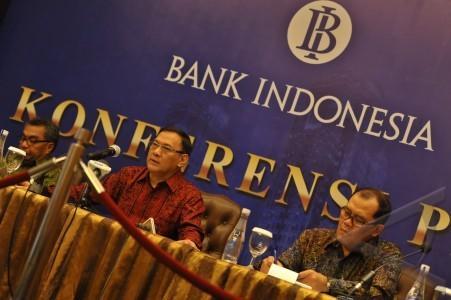Bank Indonesia Expected to Hold Rate Until Fuel Prices hiked
Bareksa • 06 Oct 2014

Gubernur BI dalam Konsfrensi Pers (ANTARA FOTO/Yudhi Mahatma)
There's no room to reduce the policy rate in an effort to boost growth
Bareksa.com - Indonesia's central bank is expected to hold its benchmark interest rate unchanged on Tuesday, its last policy meeting before Joko Widodo becomes president and one taking place after political setbacks for him generated some investor jitters.
Inflation is currently manageable and that trade balance is less of a worry that before, but there's no room to reduce the policy rate in an effort to boost growth, which in the second quarter was at the slowest pace in nearly five years.
All 16 analysts in a Reuters poll predicted Bank Indonesia (BI) will keep the policy rate at 7.50 percent as it seeks to stem volatility in the foreign-exchange market.
The analysts also agreed that the central bank would leave unchanged its overnight deposit facility rate, known as Fasbi rate, and the lending facility rate.
The rupiah recently touched an eight-month low against the dollar after opponents of President-elect Joko Widodo scrapped direct elections for regional posts and secured the speaker's position in parliament. Lack of a majority in the new legislature will make it difficult for Widodo to push a reform programme.
Indonesia's main stock index fell to a three-month low on Friday following election of the speaker.
"The main focus for the central bank is to maintain financial market stability at this point," Gundy Cahyadi, an economist with DBS in Singapore, wrote in an e-mail. "September is another reminder that Indonesian markets remain vulnerable to the global risk environment."
BI has kept its policy rate at 7.50 percent since November 2013 after hiking it 175 basis points to contain the current account deficit, support the rupiah and control inflation.
SMALLER TRADE DEFICIT
Analysts say BI is comfortable with inflation and current account levels at present. Annual headline inflation in September was 4.53 percent while January-August had a trade deficit of about $1.4 billion, much smaller than the $5.6 billion gap during the same period of 2013.
Widodo, who takes office on Oct. 20, wants to fast-track a cut in costly fuel subsidies to free up budget funds for infrastructure, agriculture, healthcare and education. But he hasn't been clear on when fuel prices will rise.
Higher fuel prices will cause an increase in overall inflation, and that will put pressure on BI to hike rates even though that could hurt consumption and growth.
Most analysts expect no change in fuel prices this year, and therefore anticipate the central bank will hold rates the rest of 2014.
But David Sumual, economist at Bank Central Asia, expects a fuel increase by November, in line with statements from an advisor to Widodo's transition team. So he forecasts that BI will raise rates next month by 50 basis points to 8.0 percent.
In April-June, the economy grew 5.12 percent from a year earlier, compared with 5.22 percent in the previous quarter. BI has forecast annual growth of 5.02 percent in the third quarter. (Source : Reuters)